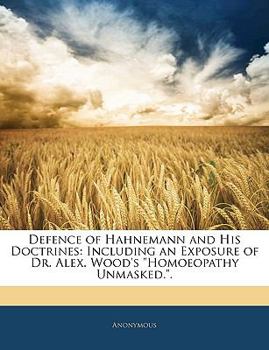Defence of Hahnemann and His Doctrines: Including an Exposure of Dr. Alex. Wood's "Homoeopathy Unmasked."
"Defence of Hahnemann and His Doctrines" is a passionate and detailed response to criticisms of Samuel Hahnemann, the founder of homeopathy, and his medical theories. This book serves as both a defense of homeopathic principles and a sharp critique of its detractors, most notably Dr. Alex. Wood, whose work "Homoeopathy Unmasked" is directly addressed and refuted. Exploring the core tenets of homeopathy, the author elucidates Hahnemann's principles and counters the arguments against them, making a case for the validity and efficacy of this alternative medical system.
This work offers valuable insights into the historical debates surrounding homeopathy in the 19th century, showcasing the fervor and intellectual rigor of its proponents. It is essential reading for anyone interested in the history of medicine, the development of alternative medical practices, and the controversies that have shaped the landscape of healthcare. The book revives a pivotal moment in medical history, preserving the arguments and perspectives of those who championed a different approach to healing.
This work has been selected by scholars as being culturally important, and is part of the knowledge base of civilization as we know it. This work was reproduced from the original artifact, and remains as true to the original work as possible. Therefore, you will see the original copyright references, library stamps (as most of these works have been housed in our most important libraries around the world), and other notations in the work.
This work is in the public domain in the United States of America, and possibly other nations. Within the United States, you may freely copy and distribute this work, as no entity (individual or corporate) has a copyright on the body of the work.
As a reproduction of a historical artifact, this work may contain missing or blurred pages, poor pictures, errant marks, etc. Scholars believe, and we concur, that this work is important enough to be preserved, reproduced, and made generally available to the public. We appreciate your support of the preservation process, and thank you for being an important part of keeping this knowledge alive and relevant.





